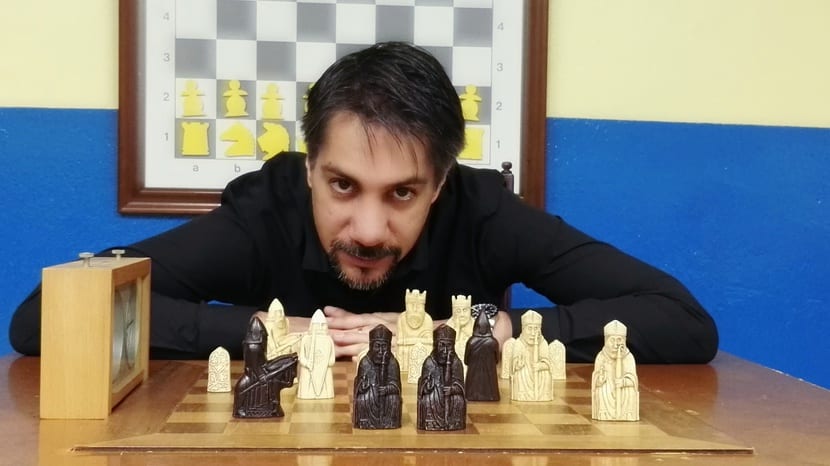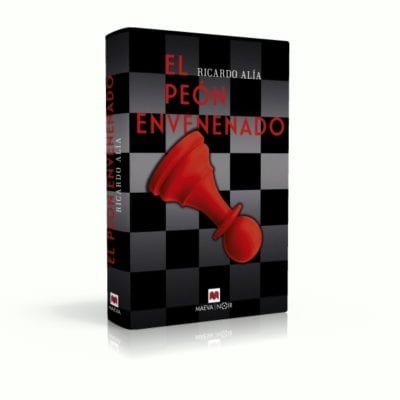
Ricardo Alía, chemistry and chess as a common thread in the plots of his novels.
We have the privilege and pleasure of having today on our blog with Ricardo Alia (San Sebastián, 1971), writer of the black genre with four successful novels to his credit: la Zodiac Trilogy, where he uses his knowledge of chemistry to build a plot that hooks the reader, and The Poisoned Pawn, in which the great protagonist is chess.
Actualidad Literatura: Ricardo Alía, a writer who mixes his passions in his books, the black genre, chemistry and chess. Chess as the common thread of The Poisoned Pawn and the chemistry in the Zodiac Trilogy, which you do not abandon in The Poisoned Pawn, give a special singularity to your novels, a unique distinctive touch. Ricardo Alía's three passions united in his books?
Ricardo Alia:
Yes, I am a chemist by profession, a writer by vocation and a passionate chess player. In my books I try to apply a recommendation from Stephen King (one of my reference writers): “write about what you know”.
AL: The Poisoned Peon is set in the Spanish civil war, with the bombing of Gernika as the trigger for the events that happened later, at the end of the dictatorship and the main plot of intrigue in the early 2000s. Does the past have consequences decades later? Reflection of the evolution of Spanish society?
LR: One of the reflections that I wanted to convey with The Poisoned Peon is that the past is there, it does not forget, it stalks you and in the end it reaches you. Indeed, a faithful reflection of Spanish society, now back with the exhumation of Franco, the Law of Historical Memory ...
AL: You said a few months ago in an interview that "Thanks to chess I stayed away from ETA environments." Arturo, the great chess master, protagonist of The Poisoned Pawn, also sees his future marked by his early passion for chess.
And all the characters are the fruit of their experiences. Is there a deterministic touch in your novels? Did chess mark your life as that of the protagonist of The Poisoned Pawn?
LR: The past traps the characters of The Poisoned Pawn and determines their actions. This is essential for the reader to "feel" the evolution of the characters. In adolescence, chess formed me as a person, it instilled in me values that I apply in life today. I owe a lot to the art of 64 squares. I have wonderful memories of those years.
AL: The Poisoned Pawn is a crime novel that can be read without any knowledge of chess, even though chess is the common thread of the plot from beginning to end. I attest that it is so. How do you make the difficult easy with a subject of such complexity?
LR: I was careful not to saturate the novel with chess references (I collect old chess books). The line that separates a novel from a chess manual is not as thick as it seems. In the galleys I endeavored to read the manuscript over and over again, avoiding the chess game between the protagonist and the murderer, and the diagrams that dot the text, and I found with relief that the novel worked as such; even one of the first readers told me that he saw chess as a Macguffin ...
AL: After The Zodiac Trilogy, set in San Sebastián, new characters and a new location for The Poisoned Peon: London is the setting you choose on this occasion, although you connect with Guernica and the imaginary town of Monroca. Does it add difficulty when writing, recreating a city and a culture that is not yours? What will become of the characters in the Zodiac Trilogy? Do we hear from them again?
LR: I repeat myself, it is important to write about what you know. At the end of the 90s I spent a season in London and I have transferred those experiences to The Poisoned Pawn. Monroca is based in Monroy, my father's town. I want to grow as an author and in each novel I explore new worlds and new characters. I don't think I'll go back to Zodiac TrilogyPerhaps he will write a prequel to Max Medina in his Madrid stage as a member of the National Police, but it will not be in the immediate future.
AL: Will the Poisoned Pawn start a new trilogy around chess or are the following projects going in different directions?
LR: The idea is to move away little by little from the crime novel and explore other literary genres. I am an eclectic reader and that should be reflected when writing. Now I'm working on a gangster novel set in Chicago in the 90s.
AL: Tell us more about yourself: How is Ricardo Alía as a reader? What are the books in your library that you reread every few years? Is there an author that you are passionate about, one of those from whom you buy their novels as soon as they are published?
LR: I only reread Gabriel García Márquez and the "bible" While i write by S. King; life is very short and there is much to read. I run to a bookstore with the latest from Vargas Llosa, NesbØ, Lemaitre, Don Winslow, Murakami ...
AL: Why crime novel?

The Poisoned Pawn: A game of chess. London the board and unknown humans the pieces a murderer plays with.
LR: I am passionate about crime fiction, it is the genre that gives me the most pleasure when it comes to reading and gives me a lot of freedom with writing, but as I said before I don't want to pigeonhole myself, in fact I started as a “noir” writer almost by chance since in the drawer he kept other writings but the editorial MAEVA was looking for a crime novel set in the north, the rest is history ...
AL: Despite the traditional image of the introverted writer, locked up and without social exposure, there is a new generation of writers who tweet every day and upload photos to Instagram, for whom social networks are their communication window to the world. How is your relationship with social networks?
LR: I recognize that I am a “Salinger style” writer. If I could, I would publish with a pseudonym and without a photo, but nowadays that is impossible, we must give visibility to the novels and we writers have to push to publicize the product. Social networks are fundamental, I move in all but not every day, I do not have time and I have to manage it between family, work, reading and writing, those are the priorities, I know cases of writers who read less because they are more in social media, what which I consider a serious mistake.
AL: Literary piracy: A platform for new writers to make themselves known or irreparable damage to literary production?
LR: The idea that culture should be free is ingrained in this country, but then, what do creators live on? My books within a week of being published are already pirated. It is an endemic evil that should be eradicated from the base that piracy does a lot of damage to the authors. Before downloading a book, you can go to libraries, second-hand bookstores or free platforms. I am a regular at the Barcelona Municipal Libraries Network.
AL: Paper or digital format?
LR: Paper, no doubt. I started strong with the ebook but the truth is that now I don't even know where I have it. The touch of the paper, the cover, turning the pages, the reading point, is an insurmountable sensation.
AL: And to finish the most personal question, what are Ricardo Alía's dreams fulfilled and yet to be fulfilled?
LR: The personal and the easiest J Publishing is the dream fulfilled and living from writing is the dream to be fulfilled.
Thank you, Ricardo Alia, I wish you to continue collecting successes in each new challenge and that you continue to hook readers to the well-constructed plots to which you have us accustomed.